December 1 - 31, 2024: Issue 637
Marine Rescue Cottage Point
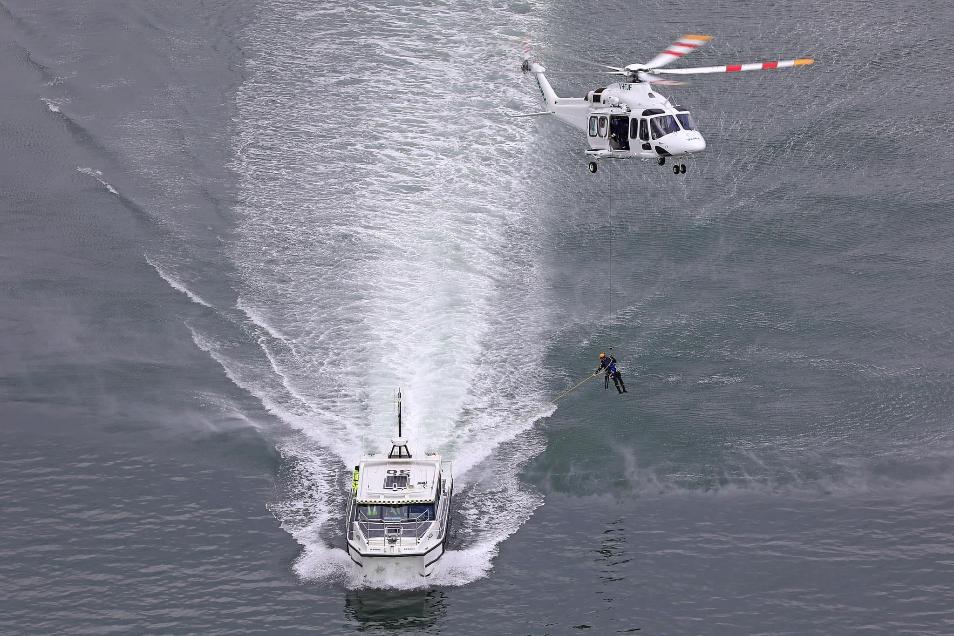
Four Marine Rescue NSW volunteers, with a combined 88 years of service between them, were awarded Marine Rescue NSW Life Membership at the Annual General Meeting (AGM) held in Cronulla on Saturday November 23 2024.
Marine Rescue NSW Chair, Mr James Glissan AM ESM KC, said the four recipients—Elizabeth Watts (Marine Rescue Cottage Point), Noel Parkinson (Marine Rescue Botany Port Hacking), Father Carmelo Sciberras OAM (Marine Rescue Hawkesbury), and Keven Marshall ESM (Marine Rescue Ulladulla)—are extremely deserving of the honour.
“This incredible group of highly skilled and dedicated volunteers have given decades of exemplary service to the boating community of NSW, and it is a pleasure to award them Life Membership of Marine Rescue NSW.
“The Marine Rescue NSW Board is grateful for their commitment to saving lives on the water and the service they have provided to their local communities,” he said.
Among those named was MR Cottage Point Volunteer Beth Watts. Marine Rescue NSW stated;
Elizabeth (Beth) Watts – Marine Rescue Cottage Point
Elizabeth Watts has been awarded Life Membership of Marine Rescue NSW following almost 30 years of service at Marine Rescue Cottage Point. Beth is a highly experienced mariner and serves as a Marine Rescue NSW Coxswain and State Operations Group Field Operator.
Since July 2022, Beth has served as Deputy Unit Commander at Marine Rescue Cottage Point, in addition to fulfilling many other roles at the unit, including Trainer, Assessor, and Operations Officer. Beth now adds Marine Rescue NSW Life Membership to the Unit Life Membership she was awarded in September 2023.
Along with her Unit's Life Membership, Beth and fellow MRCP volunteer member John Aitken both received National Emergency Medals for their service during the 2019 bush fires in September 2023.
During that same month a year later MRCP volunteers were out on the Hawkesbury River on the afternoon and night of September 25 2024 supporting the NSW Rural Fire Service; ''We're transporting RFS volunteers and equipment on rescue vessel CP 30 to a fire burning at Little Wobby, an area only accessible by water.'' the unit said
Elizabeth Watts - Life Member of Marine Rescue NSW. MRNSW photo
Pittwater Online had a chat to Beth after her Life Membership was announced.
Congratulations Beth and thank you for your service. When did you join MRCP and why did you want to join Marine Rescue?
In 1995 – I was doing some sailing and getting into that and my brother-in-law had just joined. He said ‘come and do some work with us because it’s good fun’.
I chose Cottage Point as it’s the closest to where I live. Not a great deal of people live at Cottage Point, so we have people come from everywhere, including one from Penrith. We even had a member who used to commute from Perth once a month to come back and do her duties, so that tells you how tough it is, being part of the Marne Rescue Cottage Point unit.
What’s the best thing for you about being pa of the Marine Rescue Cottage Point unit?
It’s a good bunch of people and we get to go out and help people on the water.
Members are of all ages and from a variety of backgrounds with a wide range of skills and education, so everyone benefits from that, especially the unit itself through that depth of knowledge and experience.
It’s not everyday that we go out and save lives, we are mostly going out and making peoples days that were going pretty horrible better – but we try to do that with a smile on our face and in a professional way as this takes the stress out of what people are going through.
Every now and then it does get pretty nasty, and that’s where the training we undertake kicks in to enable us to serve others with every member of the crew doing their assigned role.
Even though we are in a beautiful National Park we do get quite a few medical assists, so when we get them to an ambulance and the lights and sirens are going, and we later hear they have pulled through, we are happy to have been of service.
You have also undertaken a number of other roles in the unit; Training Officer, Operations Officer – what does that involve?
We’re a training organisation so we are continually training; and that, once again is a great part about being a member of Marine Rescue – you are always learning. Also being able to pass on knowledge to others as well is nice. Being Training Officer is about co-ordinating the different aspects of training within the unit. We get a good bunch of volunteers and have people who don’t necessarily have any experience or training and we make sure they learn how to do what we do. How to keep themselves safe and how to keep everyone else safe forms part of that.
So we run courses internally and also have our people attend courses with the larger Marine Rescue community.
You have also undertake the Deputy Unit Commander role?
Yes – we’re fairly self-sufficient so we have to manage our own recruits, finances and operationally we have to ensure our vessels are checked and maintained to the right standard. There is also the roster and schedule – it’s like any organisation where you are focused on what needs to be done and looking after our people.
Marine Rescue undertakes Winter training exercises with the local NSW RFS fireboat units on the Hawkesbury; have you been on one of those?
We do have a good relationship with the local guys and girls on the RFS fireboats and the RFS land based brigades. We have done some training with them because we need to learn about fires on boats as that’s one of the things we could be potentially be called to, and also help them during bushfires. The last time there was a fire at Wobby Beach we were helping ferry the firies across as that was a water-access only area. Heir fireboats were busy fighting the fire and we were there to help deliver people. In the past we’ve also helped them to deliver meals and deliver water when we’ve had fires in the national park.
I recent years Marine Rescue units have been deployed up the Hawkesbury river to assist people during flood emergencies with evacuations o for delivering food and water when people have been cut off. Has MRCP been involved in those operations?
I haven’t been – I think the last one I was involved in was 2013 or 2014. We now do have a special Operations Group which has been undergoing flood training because this, with the bushfires and floods, is something we’ve had to do. Members have been out to Penrith to practice in the rapids and make sue we can get people out. This is again a different environment and a bit of a challenge.
As we both know, half of Pittwater will ‘evacuate’ to the Cowan Creek and offshore Pittwater over Summer to have that bit of seasonal peace – what would you like visitors and locals who head west to be aware of this boating season?
Please log on with Marine Rescue if you are going on a trip and log off when you get home – and stay safe on the water. Make sure you have water, make sure you have fuel before you head out, that your lifejackets are on, take sunscreen, hats – the whole deal – and make sue you let someone know where you are
Flag us down just to say hello if you see us in passing – we are here to help, whether it’s something big or small. Quite often it’s the small things that can turn into big things and we’d rather deal with them when they’re small.
And, of course; enjoy the waterways!
We will be here to assist you should you need us.
Marine Rescue NSW Commissioner Alex Barrell, when asked for a comment on Beth's award, stated;
''Elizabeth’s dedication to Marine Rescue Cottage Point and her local community for almost three decades makes her a worthy recipient of Marine Rescue NSW Life Membership.
To have a woman of her calibre amongst our ranks is a real asset for our Service.
Marine Rescue NSW is extremely thankful for her commitment to the Service and the state’s boating community.
Elizabeth will soon mark 30-years with Marine Rescue Cottage Point and we look forward to celebrating the milestone with her in August next year.''
Of course, with only days to go until many 'clock off' for the Christmas - New Years break, a timely reminder for the Summer 2024-2025 Boating safety is to make sure your local Marine Rescue NSW Unit knows you are going out.
Marine Rescue NSW Commissioner Alex Barrell asks that everyone heading out on the water this season remembers to Log on and Log off.
Logging On and Off
''Marine Rescue NSW’s free, internationally recognised app is a must for all boaters.
Logging On provides details of a boater’s trip and ensures that our highly skilled and dedicated volunteers keep watch for their safe return. In the event a boater does not return as planned, a search will be initiated.
The Marine Rescue NSW app plays a vital role in helping save lives on the water and providing peace of mind for boaters and their loved ones.
Boaters can also Log On via marine radio, VHF channel 16.'' Commissioner Barrell said
Summer boating safety tips
''Users of the state’s waterways can rest assured that our volunteers are rescue-ready 24/7 but we ask all boaters to make sure their vessel is in good working order and they have the correct safety equipment on board.'' Commissioner Barrell stated
''Boaters should always wear a lifejacket, carry enough fuel with plenty in reserve and always monitor the weather.
We ask all boaters to check the conditions before heading out and not to risk their life.
There is absolutely no shame in getting to the boat ramp and deciding not to go out because of unfavourable conditions, it is not worth endangering your life or others for a day on the water.
Always Log On with Marine Rescue NSW and boat like your life depends on it to avoid becoming a statistic this summer.'' Commissioner Barrell said
Details on how to Log on and Log Off are at the base of this page for you.
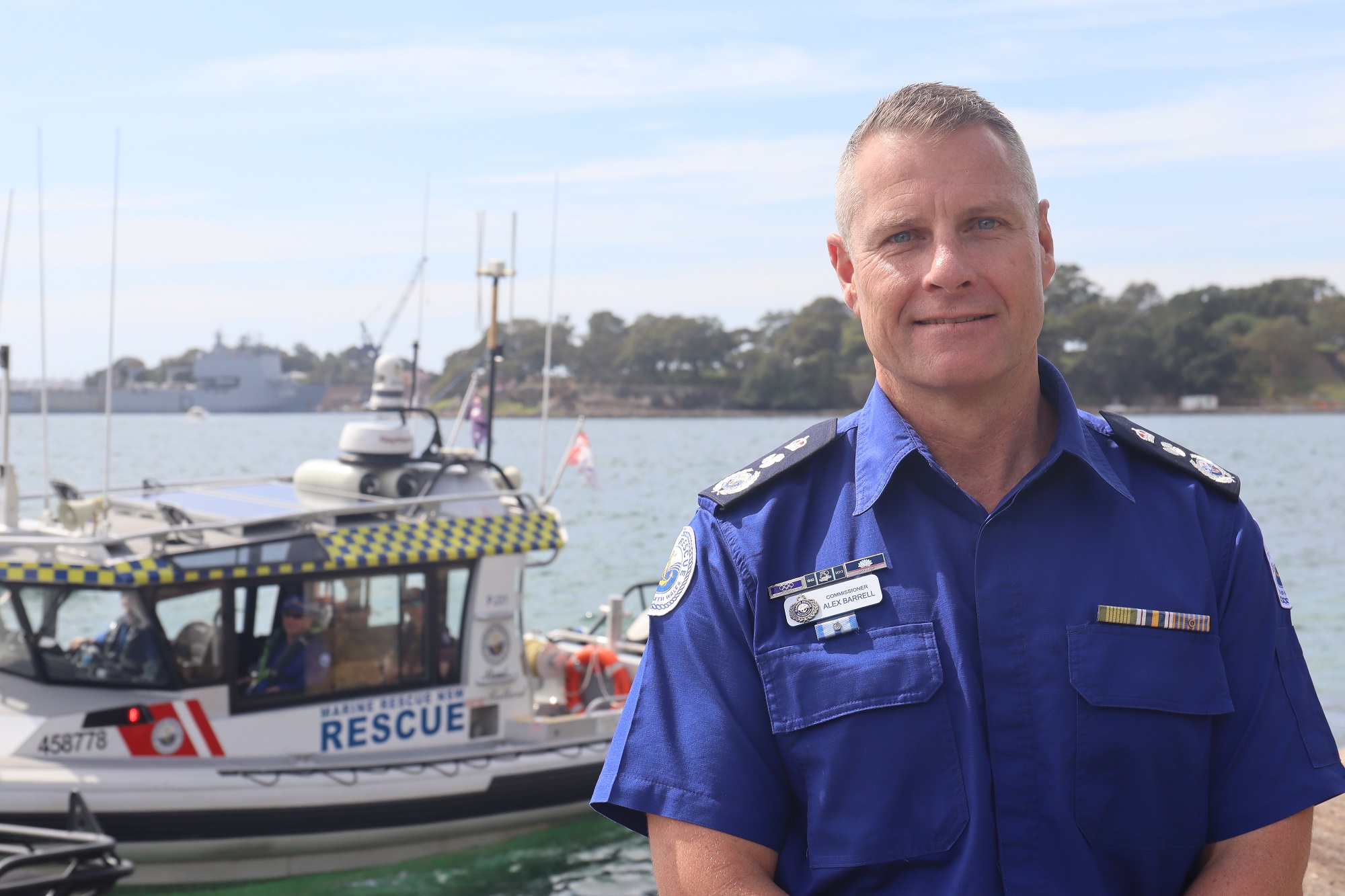
Marine Rescue NSW Commissioner Alex Barrell. Photo: MRNSW
This week we'd like to share a few insights into the Marine Rescue Cottage Point unit, which may be out of sight to some, but is never out of mind to those who live in Pittwater.
Our thanks to Leanne Chandler, Acting Unit Commander Cottage Point, for her help in putting this insight together. Leanne served with the NSW RFS prior to becoming a Marine Rescue Cottage Point volunteer and is clocking up almost three decades of serving our community as a volunteer through her former RFS service and has now been with MRCP for over 16 years.
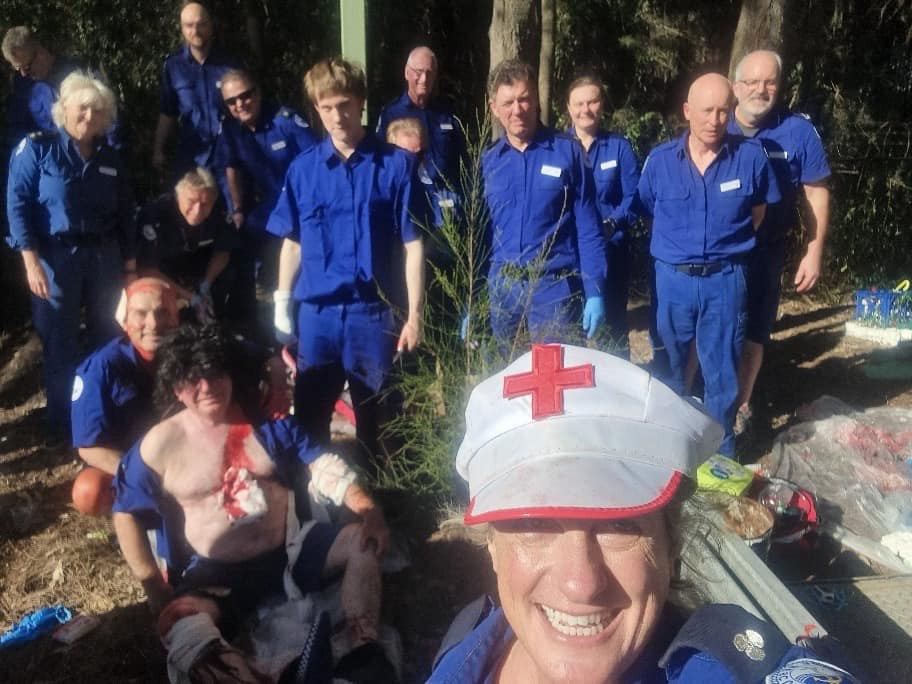
One of Marine Rescues' top First Aid and Advanced Resuscitation trainers around; Leanne Chandler (Leanna is at the front of photo - and conducting a training exercise - no one is hurt in this photo; they're practicing)
Marine Rescue Cottage Point is part of Marine Rescue NSW – operating as the state’s independent, not-for-profit organisation that helps save lives at sea. Working alongside the NSW Police Marine Area Command and other emergency services, Marine Rescue Cottage Point volunteers performed 155 rescues during the 2023/24 financial year, safely returning more than 350 people to shore. Demand for the unit’s services has increased from the average of 122 rescues for the past 7 years.
Located in the grounds of Kuring-Gai Motor Yacht Club, Marine Rescue Cottage Point provides assistance not only to boaters in the Broken Bay region, but to the residents and visitors of remote and water-only accessible areas of Cottage Point, the Hawkesbury River and Pittwater. We are on duty on weekends and public holidays (Throughout December & January we work with our sister units [Marine Rescue Broken Bay, Hawkesbury and Central Coast] to provide coverage for the region on weekdays; and are on-call 24/7 via the Marine Rescue NSW State Communications Centre at Belrose (callsign: Marine Rescue Sydney).
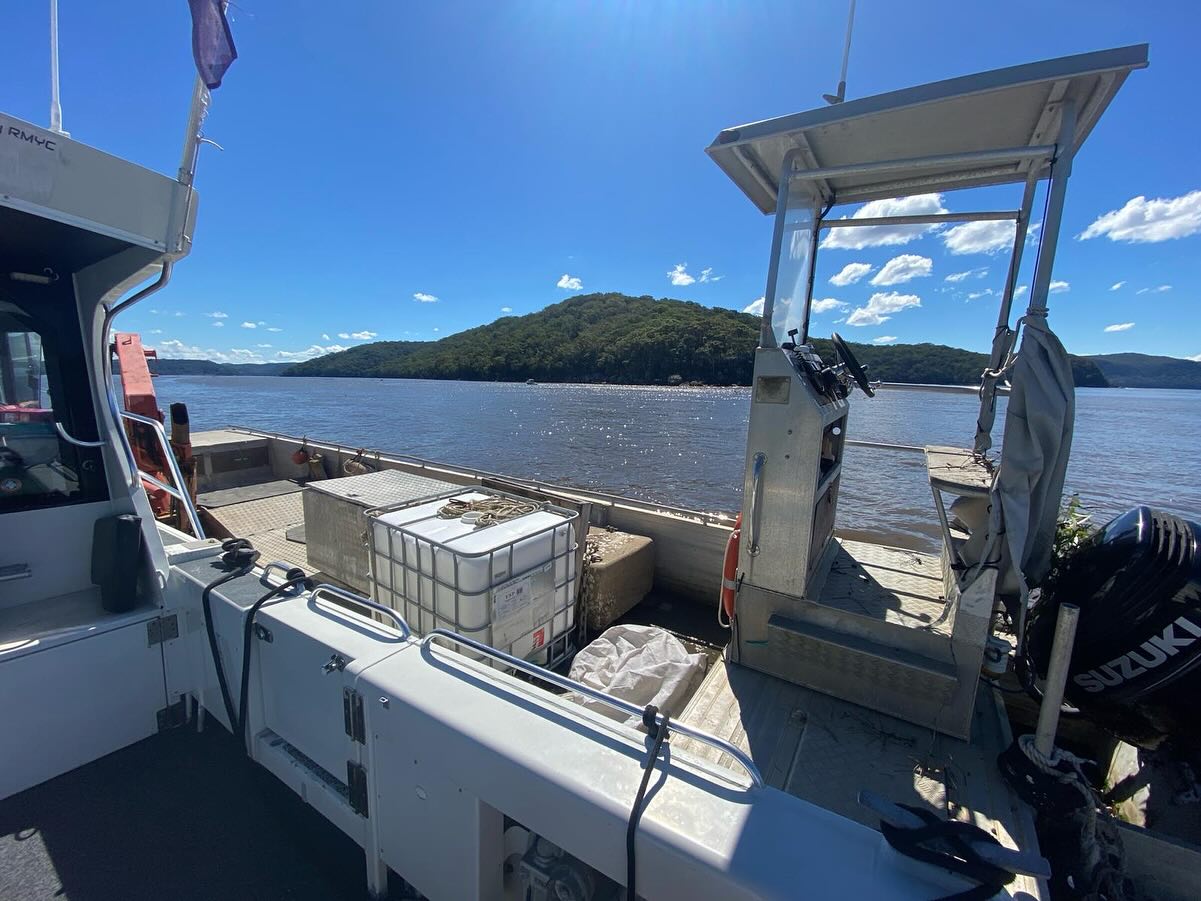
MRCP on the Hawkesbury retrieving an adrift barge and refuse that had been dislodged by flooding - April 2024
In the past [financial] year, our 73 members have (cumulatively) volunteered over 950 hours on the water, consisting of patrolling, training and performing rescues while being on standby and available for deployment for over 4000 hours.
Our base / muster room is approximately 10m2, which often accommodates up to 14 of our volunteers on any given duty day. While KMYC generously provides our unit’s base and facilities for free, our base is in need of a makeover for better functionality and to help cope with our increasing number of volunteers.
Marine Rescue Cottage Point has two rescue vessels – CP 30, an 11.5m Sailfish catamaran and CP 31, a 10.3m Sailfish catamaran. Both vessels are endorsed as Category 3 rescue vessels by the State Rescue Board and are in 2C commercial survey, travel up to 30 nautical miles offshore to perform rescues. However, our vessels are approaching 10 years of service.
Marine Rescue Cottage Point Expenditure 23/24 financial year Fuel was $43,100.00 and our Vessel Maintenance: was $43,970.00, we rely heavily on donations from the local community.
.jpg?timestamp=1733546206357)
MR CP 30 - the Chris Gillett
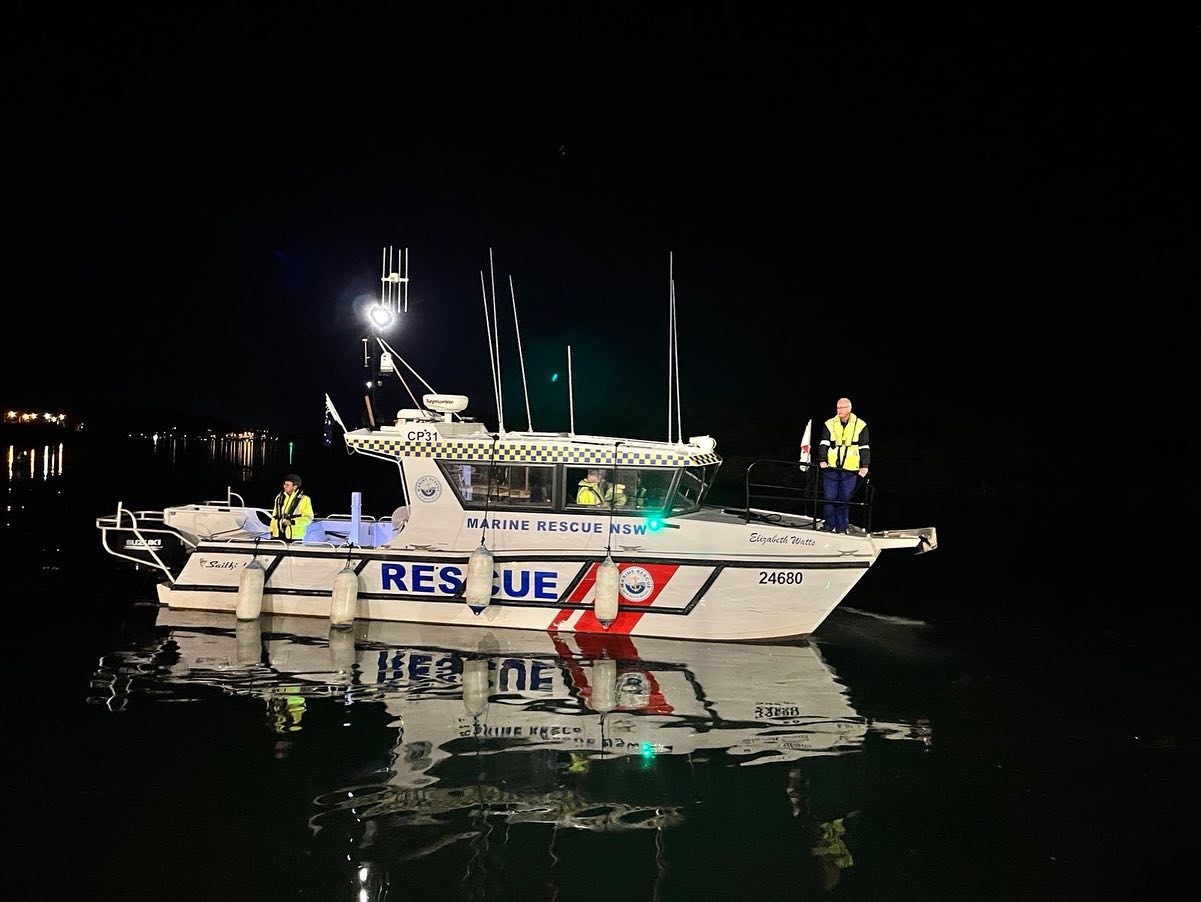
MRCP 31 - the Elizabeth Watts (during a night navigation exercise: Winter Training)
Our volunteers conduct regular fundraising, selling meat raffle tickets at Royal Motor Yacht Club or turning sausages at Bunnings to help with funding to ensure our vessels are operational and that our volunteers are trained to the highest standards. This is above their rostered duty days.
We cannot pay our volunteers; our focus is giving them praise for all the hard work that they put in to assist the community on the water and surrounding communities.
How can readers help?
Generously support us when they see our volunteers selling raffle tickets or sausage sandwiches. Get in contact about small projects to help fund (We urgently need to raise funds to replace jump start packs for this boating season).
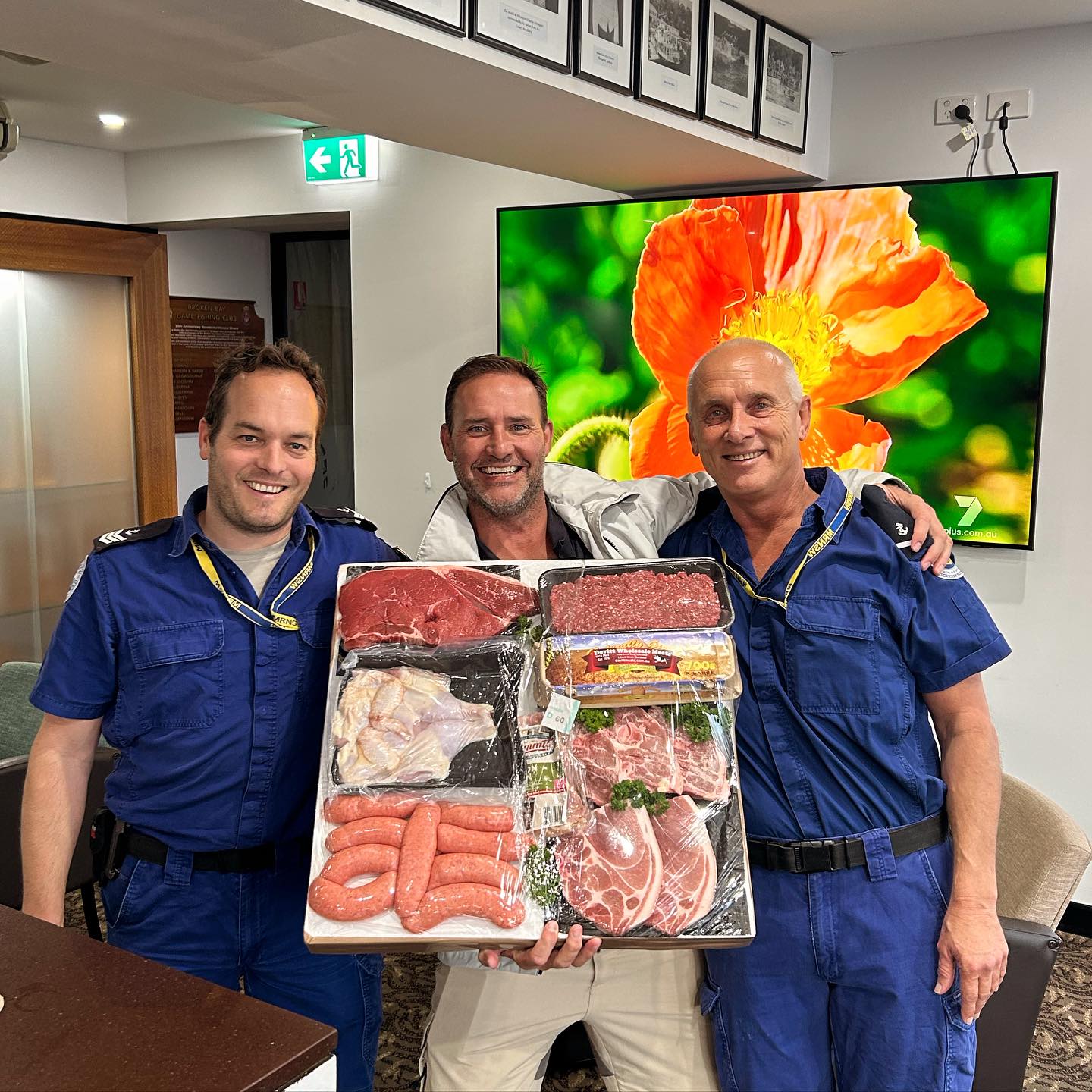
MRCP meat tray raffles in RMYCBB; two MRCP volunteer members with a happy winner
As for volunteer recruitment.
Marine Rescue NSW has just over 3,400 volunteers serving the boating community at 46 units across the state, from Point Danger on the Tweed to Eden on the far South Coast and on inland waterways at the Alpine Lakes and Moama on the Murray River.
Your readership would be familiar with Marine Rescue Broken Bay, Marine Rescue Terrigal, Marine Rescue Central Coast, Marine Rescue Cottage Point and Marine Rescue Hawkesbury – all those units perform search and rescue missions on the waters of Pittwater, Broken Bay, Cowan Creek, the Hawkesbury River and offshore.
The best way to learn more about volunteering with Marine Rescue NSW is via the website: www.marinerescuensw.com.au/become-a-volunteer/
History
Since 1968, Cottage Point and the local area have been continuously served by a dedicated team of volunteers committed to saving lives on the water. For almost all that time the Cottage Point unit has been located within the grounds of the Ku-ring-Gai Motor Yacht Club. We are extremely grateful for the club’s ongoing support.
Founded as a flotilla of the Australian Volunteer Coast Guard Association, the Cottage Point volunteers carved away from the Sydney squadron to serve the ever-increasing amount of marine traffic to Sydney’s north. At the time, marine rescue services were only available by using members’ own vessels and the safety equipment and member training was rudimentary at best. As the service matured (and as more fundraising dollars and donations were squirrelled away) the unit gradually acquired a series of second-hand vessels from a variety of sources.
In 1989, Cottage Point added a second patrol vessel to improve response times, provide greater flexibility and enhance its training capability. The unit maintains a two vessel operation to this day.
As the unit grew through the 1990s, two all-weather, purpose built vessels in full Coast Guard livery graced the dock at Cottage Point. With these new vessels came vastly improved on-board technologies and competency-based training for all crew members. Still desperately short of funding, the unit scraped along through fundraising, donations and the generosity of the members.
Since joining the new MRNSW in 2010, however, the unit has gone from strength to strength.
The Cottage Point unit has always maintained a close link to our parent organisations, with several of our members being involved in broader state roles. In the early days of the Coast Guard, eight Cottage Point members were elected NSW Squadron Commodore, while many others acted in various executive roles, including Deputy Squadron Commodore, Squadron Training Commodore and Staff Captain.
At the national level, two of our members have held the position of National Commodore and another National Training Commodore. Two more served as National Stores Officers and yet another as National Public Relations Officer.
Since the formation of MRNSW, and powering to the rescue on sister vessels Cottage Point 30 and Cottage Point 31, Marine Rescue Cottage Point has had two Board members and a Regional Controller appointed from within its ranks.
For the past 50+ years, the Cottage Point unit has served an operational area that covers Brisbane Water and Ku-ring-Gai Chase National Parks and Mudgamarra Nature Reserve, encompassing Broken Bay, Pittwater, Brisbane Water, Hawkesbury River, Cowan Creek and environs – over 150km of sheltered navigable foreshore.
This operational area also extends 30nm seawards, covering the dozens of offshore reefs that are popular with anglers. As part of MRNSW, the mighty Cottage Point unit is looking forward to continuing to serve the local boating community for 50 more years!
Cottage Point volunteers save lives on Sydney’s pristine northern waterways.
Marine Rescue NSW is a volunteer based not-for-profit professional organisation dedicated to keeping boaters safe on the water and supporting local communities.
History by Tim Pike, From Soundings, Quarterly Journal of Marine Rescue NSW | Issue 39, Winter 2019 – a special 10 year anniversary Issue.
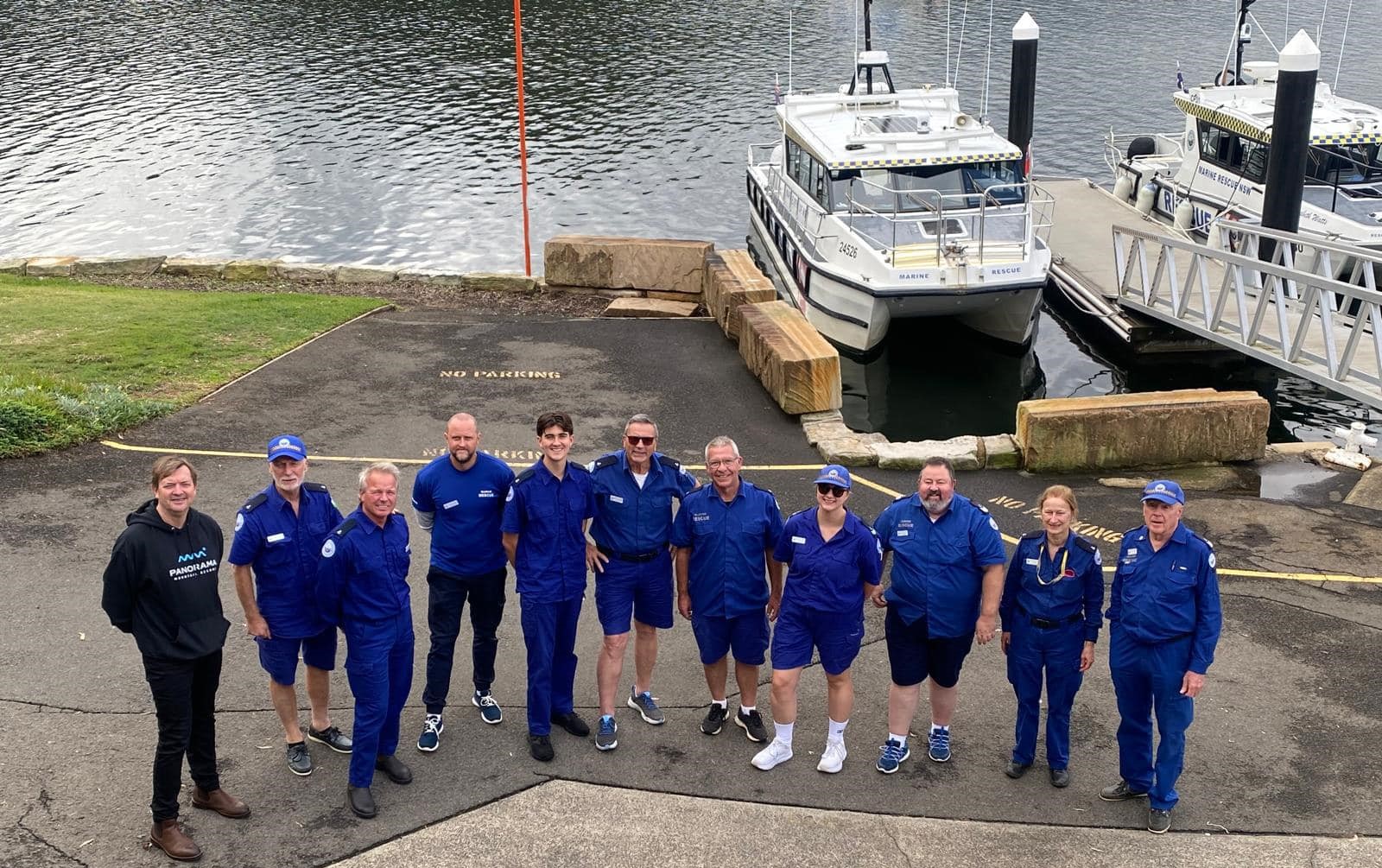
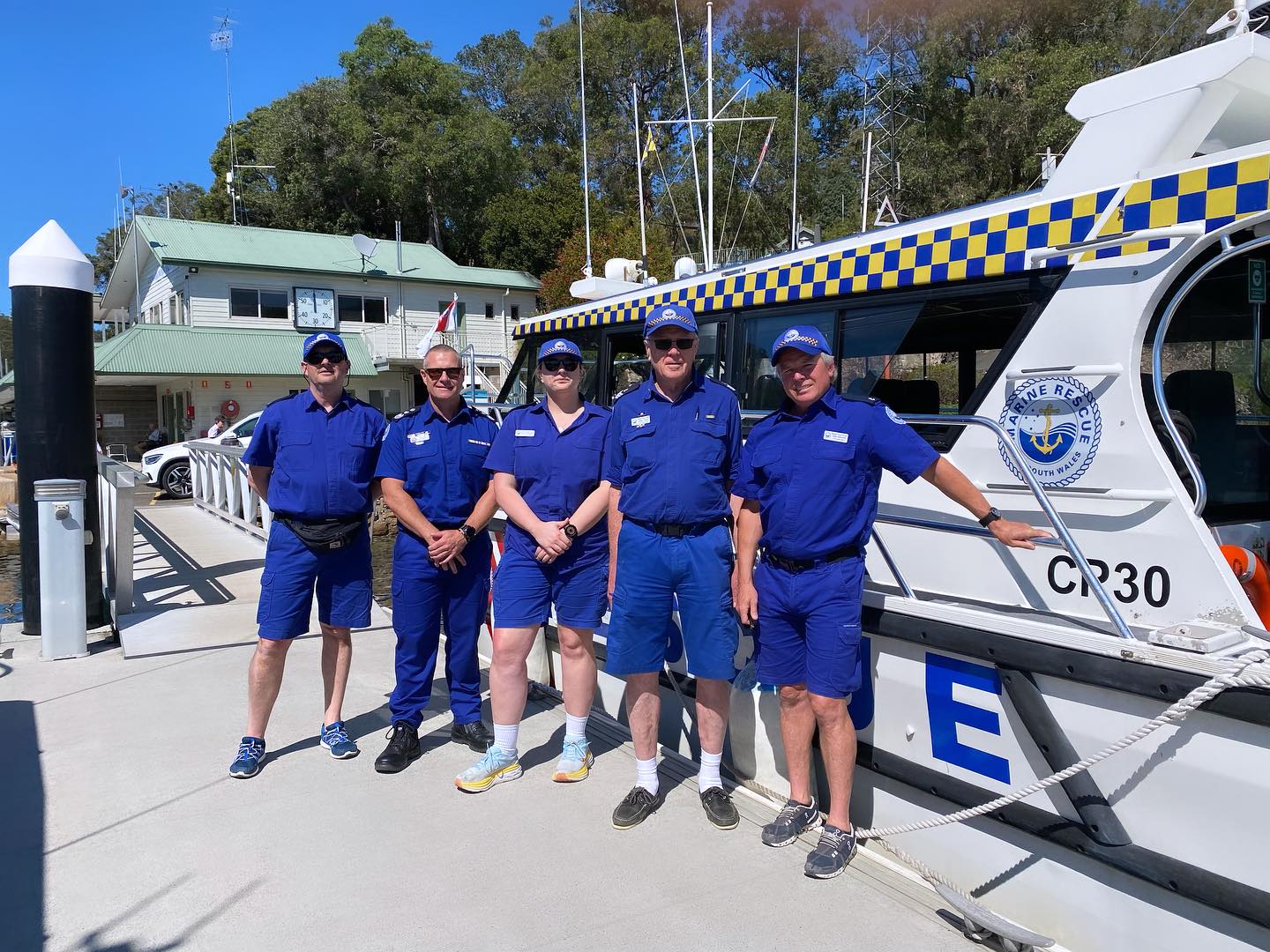
Marine Rescue NSW Commissioner Alex Barrell visiting Marine Rescue Cottage Point. MRCP photos by MRCP
The three other Marine Rescue NSW volunteers awarded Marine Rescue NSW Life Membership at the Annual General Meeting (AGM) held in Cronulla on Saturday November 23 2024.
Noel Parkinson – Marine Rescue Botany Port Hacking
Noel Parkinson has been volunteering with Marine Rescue Botany Port Hacking since February 2001 and is a highly respected member of the unit.
As a Marine Rescue NSW Coxswain and Watch Officer, Noel has played a vital role in countless search and rescue missions. He is a former Unit Commander at Botany Port Hacking and is currently serving as Admin Officer.
Father Carmelo Sciberras OAM – Marine Rescue Hawkesbury
The much-loved chaplain of Marine Rescue Hawkesbury recently celebrated a significant milestone—his Diamond Jubilee, marking 60 years of ministry as a Catholic priest.
Since 1996, Father Carmelo Sciberras has been a devoted member of Marine Rescue Hawkesbury, serving not only as a crew member but also as the unit's chaplain, offering spiritual support to its members and the wider community.
Father Carmelo’s remarkable life and dedication to both his faith and Marine Rescue Hawkesbury have earned him numerous accolades, including the Medal of the Order of Australia. At 86, Father Carmelo continues to be an active part of Marine Rescue Hawkesbury. He serves on the first watch team each month and is currently training to become an accredited radio operator, proving that age is no barrier to learning new skills and continuing to serve the community.
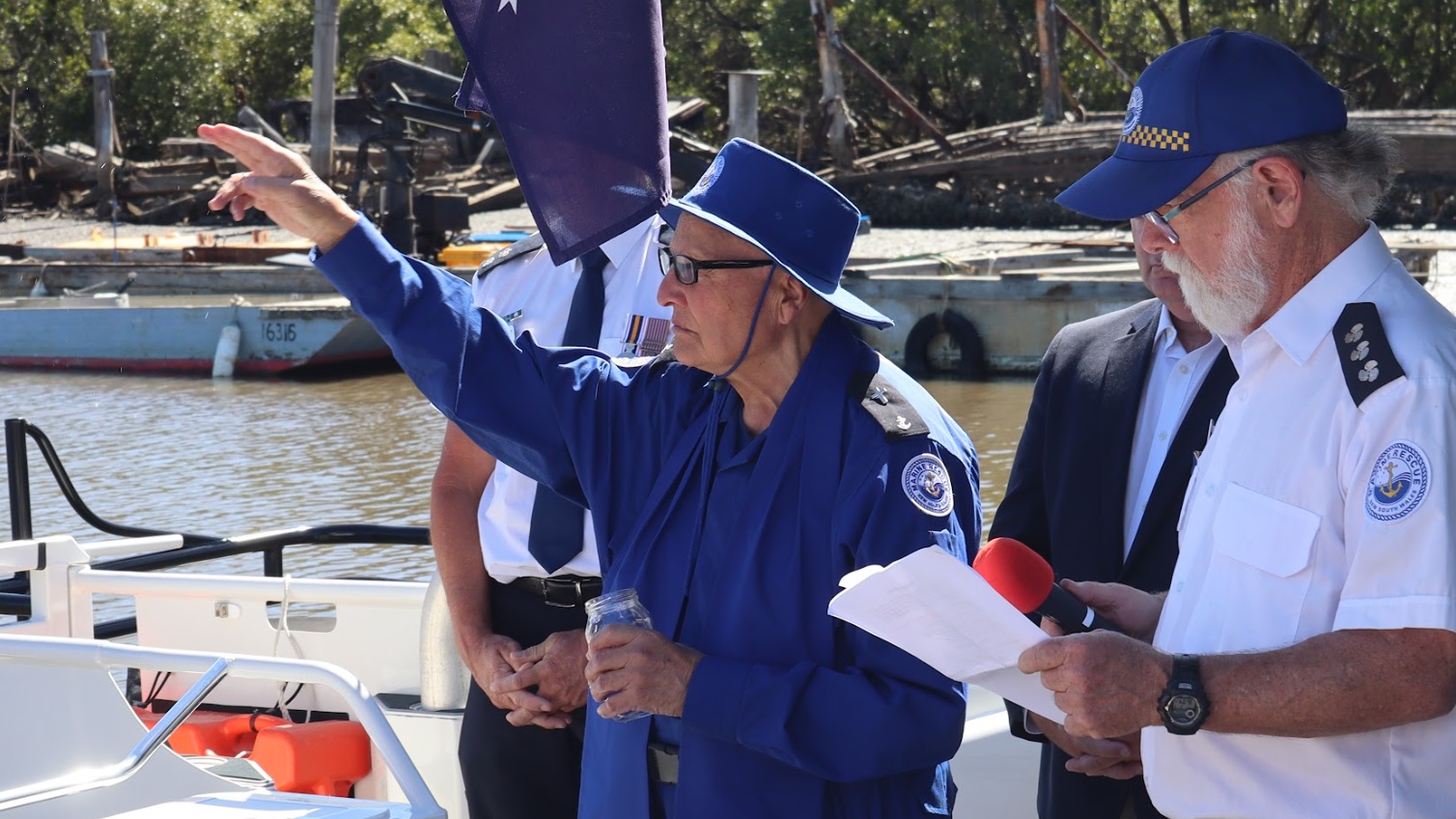
MRNSW Life Membership for Father Carmelo Sciberras
Keven Marshall ESM – Marine Rescue Ulladulla
Keven Marshall ESM has been serving the boating community of Ulladulla and its surrounds since 1998 and was awarded the Emergency Services Medal in 2017.
He has held a variety of positions at the unit, including Deputy Unit Commander. From 2013 to 2023, Mr Marshall served as a Marine Rescue NSW vessel Master and is currently a Watch Officer.
For the past seven years, he has held the role of Regional Director, Illawarra, on the Marine Rescue NSW Board but has stepped down from the position today.
Marine Rescue NSW is a volunteer based not-for-profit professional organisation dedicated to keeping boaters safe on the water and supporting local communities.
Three new Regional Directors join Marine Rescue NSW Board
Marine Rescue NSW Chair, Jim Glissan AM ESM KC, has announced the election of three new Regional Directors following the Annual General Meeting (AGM) held Saturday November 23. This leadership transition comes as Greater Sydney Regional Director Ken Edwards, Illawarra Regional Director Keven Marshall ESM, and Monaro Regional Director Glenn Felkin ESM stepped down from their positions.
The Board warmly welcomes Peter Steigrad (Greater Sydney), John Samulski CSC (Illawarra), and Caron Parfitt ESM (Monaro) as the newly elected Regional Directors.
“With their extensive leadership experience spanning maritime and corporate sectors, these new Regional Directors bring a wealth of expertise to our Board,” Mr Glissan said.
“Their dedication to operational excellence, innovation, and community engagement will be instrumental in advancing Marine Rescue NSW’s mission of saving lives on the water.”
At the AGM, outgoing Directors Mr Edwards, Mr Marshall, and Mr Felkin were recognised for their extraordinary contributions.
“Together, they have served an impressive 22 years on the Board, shaping and strengthening Marine Rescue NSW during their tenure,” Mr Glissan said.
“Their ability to balance the needs of the organisation with those of unit members has been invaluable.”
Beyond their Board roles, all three have remained steadfast in their commitment to saving lives, dedicating a combined 55 years of service as active members of their local units—Cottage Point, Ulladulla, and Batemans Bay.
“On behalf of the Board and our 3,400 volunteers, I extend heartfelt thanks to Ken, Keven, and Glenn for their remarkable service and leadership,” Mr Glissan said.
Peter Steigrad
Regional Director, Greater Sydney
Peter Steigrad has been a committed member of Marine Rescue NSW for over 15 years, dedicating more than half of this time to leadership roles at Marine Rescue Middle Harbour. He served as Unit Commander from 2018 to 2024 following a two-year term as Deputy Unit Commander from 2016 to 2018. Peter is a Marine Rescue NSW Master, holds an AMSA Certificate of Competence M<24M and a Certificate IV in Training and Assessment.
Beyond his Marine Rescue NSW experience, Peter brings a wealth of business and governance expertise. A Foundation Fellow of the Australian Institute of Company Directors, Peter serviced on the State Council from 1990 to 1996. He has served as Chair and/or Director at various organisations including the Museum of Contemporary Art, the Australian Advertising Industries Council, the Australian International Hotel School and the Child Accident Prevention Foundation of Australia. Peter was the Trustee of the Committee for Economic Development of Australia and Chair of Indigenous Community Volunteers.
As a member of the Greater Sydney region leadership team for eight years, Peter has developed a deep understanding of the challenges facing unit leadership, including financial constraints and growing operational demands. He is committed to working with the Marine Rescue NSW Directors to support units in delivering exceptional service to the boating community. In 2021, Peter was honoured with a Premier’s Citation. His dedication to Marine Rescue NSW was further recognised in 2024 with a Commissioner’s Citation, along with a mention of his service in State Parliament, which was recorded in Hansard.
John Samulski CSC
Regional Director, Illawarra
John Samulski has been a member of Marine Rescue NSW since 2019. He was elected as Marine Rescue Ulladulla Unit Commander in 2022 and has also held the role of Deputy Unit Commander.
John’s leadership experience is built on an exceptional career in military, government and civilian sectors, including an incredible 35 years in the Royal Australian Air Force (RAAF). His extensive military service includes roles such as Deputy Air Commander Australia, Chief of Defence Force Liaison Officer to Headquarters Central Command (USA), and Commanding Officer of 36 Squadron.
In addition to his operational expertise, John brings significant governance and strategic planning experience. He has operated at board level within Defence, overseeing capability management, organisational training, and current operations. He is Vice President of a charitable foundation and co-owner of a small business, further showcasing his ability to lead and manage across diverse sectors.
John’s expertise in crisis management, risk management, and search and rescue operations is complemented by his commitment to fostering strong, cohesive teams focused on achieving shared goals.
Caron Parfitt ESM
Regional Director, Monaro
Caron Parfitt has been an active and dedicated member of Marine Rescue NSW for over 11 years, serving as Marine Rescue Bermagui Deputy Unit Commander from 2016 to 2018 and as Unit Commander from 2018 to 2024. As a Marine Rescue NSW Coxswain and Watch Officer, Caron possesses a comprehensive understanding of Marine Rescue NSW operations, both on the water and in the radio room.
Caron holds a Masters of Business Administration and a Bachelor of Science in Computer Science and Statistics. Over her 40-year career, Caron gained extensive experience across information technology, marketing, customer service, strategy and project management. This includes a decade as an independent management consultant, where Caron frequently advised company boards on strategy and operational improvements.
Her leadership at Marine Rescue Bermagui has been marked by a strong focus on communication, stakeholder engagement, and risk management. As Unit Commander, Caron successfully managed significant changes, including the implementation of new technologies like ROIP (Radio Over Internet Protocols) and Seahawk, as well as updates to operational procedures. Caron is also an active member of the South Zone Diversity Group, supporting efforts to increase diversity across Marine Rescue NSW. In 2023, Caron was awarded the Emergency Services Medal in recognition of her dedication to saving lives on the water.
Marine Rescue NSW is a volunteer based not-for-profit professional organisation dedicated to keeping boaters safe on the water and supporting local communities.
New MRNSW Regional Directors Samulski, Parfitt and Steigrad. Photo: MRNSW
Log On/ Log Off
Log On & Off with Marine Rescue. It’s quick, simple and free. Log On whenever you’re heading out on the water and Log Off when you return. We’ll stand watch. If you don’t Log Off as planned, our volunteers will start searching for you.
Download from the Apple store Download from the Google play store
To Log On, call your Marine Rescue NSW base on VHF Channel 16 or use the free MarineRescue App. You can download the App at the App Store for Apple devices or Google Play for Androids.
You can always Log On, whether you’re out for a morning’s fishing, a day trip around your local area or cruising along the coastline. And it doesn’t matter if you’re on a tinnie, a cruiser, a yacht, a kayak, a canoe or a jet ski.
When you Log On via, our radio operator will ask you for some basic information about your vessel, your destination and contacts.
You’ll enter the same details on your smartphone or other device if you’re using the MarineRescue app. If you don’t Log Off, this information will help us find you, whether you’ve simply forgotten to Log Off when you returned to shore or you’re caught in an emergency and need help fast.
Tell us:
- Your boat registration number
- Where you’re leaving from
- Where you’re heading
- What time you plan to return
- The number of people on board
- Your mobile phone number
If the fish are biting and you decide to stay out longer, simply call the base on VHF Ch 16 or use the MarineRescue App to update your arrival time.
Remember to Log Off when you’re back on shore. If you haven’t let us know you’re back safely, we’ll start to look for you. We’ll try calling you first up, just in case you’ve forgotten to Log Off and headed home with your catch. That’s the best outcome. If we get no answer, we’ll step up the response.
When you Log On via the App, choose the live safety tracking option so your position is updated in our vessel tracking system every 30 minutes. This means that in an emergency, our rescue crews will have a starting point for a search operation, based on your last known position, saving valuable time when minutes can mean the difference between life and death.
.jpg?timestamp=1631952740047)
Skeds
If you’re travelling along the coastline, we encourage you to establish a voyage plan with Marine Rescue NSW and an offshore tracking schedule for you to check in (to ‘sked’) with our bases along your route. This lets us know that you’re travelling safely, on schedule and not in need of emergency help. We’ll keep track of your progress until you safely arrive at your destination in NSW or we hand you over to the marine rescue service in the next State if you’re travelling further north or south.
Preparing to go on the water
As the skipper, you're responsible for safety of the vessel and people on board. Be prepared to keep everyone safe and enjoy time on the water.
Carry enough lifejackets
Wearing a lifejacket can save your life. Make sure your vessel is carrying enough approved lifejackets for everyone on board. They must be in good condition and quick and easy to access.
Always wear a lifejacket while on the water. This means that you'll be more prepared for unexpected events, such as suddenly falling into the water.
The rules for wearing a lifejacket depend on your vessel, where you are and the level of risk.
Know the rules
Before you go out, make sure you know the rules and regulations for using NSW waterways. Key rules to help you stay safe and avoid collisions including:
- keeping a proper lookout for hazards
- knowing who you must give way to and when
- identifying and obeying navigation marks, lights and sounds
- travelling at a safe speed and keeping a safe distance between your vessel and other people, vessels and objects
- staying under the legal limit for alcohol
- knowing the rules for towing a person on the water and towing a trailer on the road.
Check the weather
Always check the weather before you head out. Be aware of warnings, marine conditions, storms, winds, waves and tides. This can make the difference between an enjoyable day and an emergency situation. If in doubt, don't go out.
Let someone know
Before you leave, contact a friend or relative or use your marine radio to log on with a coastal radio base. Tell them:
- where you're going
- your estimated return time
- your vessel details
- how many people are on board.
Take extra care to let someone know if you are going out alone.
Report in if you extend or change your trip.
You can also use the MarineRescue app to log on and log off with Marine Rescue NSW.
Know what to do in an emergency
Being on the water can be unpredictable and dangerous. Be prepared for an emergency or incident, and know what to do and who to contact if you run into trouble.
If you're involved in or witness an incident, you must always stop and give as much help as possible. Depending on the severity of the incident – for example, if someone is injured – you may need to give information to authorities.
Marine Rescue NSW provides important services, including safety education, marine radio communication, and emergency search and rescue services.
Check your vessel
Check your vessel is in good working order, including the engine and lights. Check you have all the correct equipment on board before you leave home or launch your vessel.
If your vessel is registered, check the registration has not expired.
Check your vessel is suitable for the waterways you want to travel on. For example, if the vessel is designed for enclosed waters, it may not suit open waters or along the coast where waves are larger.
Check all hatches can be opened from both the inside and outside of the vessel. Keep all hatches unlocked while the vessel is underway.
Anyone driving your vessel should have the skills and experience to handle the vessel on the waterway you're using.
Have the correct safety equipment
Check you have the correct safety equipment on board for where you're going and your vessel type.
Make sure every item is in good condition and easy to access. Everyone on board should know its location and how to use it.
Plan where you want to go
Plan where you're going and know how long the trip will take. Be aware of any special waterways or designated areas. Check the location of harbours, ports and potential refuges from bad weather.
Take extra care in cold water, especially alpine waters, where your risk of cold shock and hypothermia are increased.
Build your experience by starting out on calm, quiet waterways. Take a more experienced person with you, if possible.
Make sure you have enough fuel. Plan to use a third to get there, a third to get home, and have a third in reserve for unexpected events.
Make sure you have a compass and up-to-date chart (or map) for the waterways you will be using, especially if you're going out on open waters.
You must have a chart or map if you plan to go out on open waters.
Prepare children
If you're taking children out on your vessel:
- Make sure they have a lifejacket and are wearing it when required.
- Teach them emergency procedures and drills, such as what to do if they fall overboard or the vessel capsizes.
- Show them where the safety equipment is, and teach them how to use emergency items, such as the marine radio, EPIRB and flares. Make sure they understand they must only use them in an emergency.
- Show them how to get in and out of dinghies and small boats while keeping them stable.
- Make sure they do not have any part of their body out of the vessel when it's underway.
- Teach them about keeping a proper lookout and a safe distance from other vessels.
- If you're planning to tow, make sure they know the rules for towing people aged under 16.
- Carry everything they need to be prepared for all types of weather.
- Consider the risk of seasickness, especially if you're going out on choppy water.
- Teach children about lifejackets and sunscreen.
Download boating apps
Boating apps give you quick access to helpful information about waterways on your smartphone or tablet. For example, boat ramps, speed zones, navigation aids, weather, special events and safety advice.
Transport for NSW endorses Deckee, available for free via the Apple Store and Google Play. The Deckee app includes maps showing boat ramps, speed zones, navigational aids. It also has access to a live data feed from Transport for NSW that captures alerts, marine notices and campaigns.
Marine Rescue NSW
Marine Rescue NSW is the State’s official volunteer marine rescue service. The Marine Rescue App allows you to register details of your next boating trip.